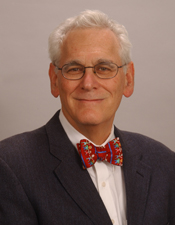Message From Our Former Director

By working collaboratively we will address the need to promote sustainable economic development in the poorest areas of the world in ways that will provide opportunities for families to improve their economic conditions, provide educational opportunities to their children, and reduce excessive maternal and child mortality.
– Stephen Berman, MD, FAAP, Former Director of the Center for Global Health
The Center for Global Health has an opportunity to make a major contribution to improving the health and welfare of the world’s poorest populations and become one of the world’s leading global health programs. We are almost at the “tipping point” to achieve this goal.
In his book, Malcolm Gladwell defines a tipping point as “the moment of critical mass, the threshold, the boiling point.” He further describes the need for three types of people to reach a tipping point that will result in meaningful sociological change; mavens or information specialists, connectors or integrators, and salesman or persuaders.
The University of Colorado and Children’s Hospital Colorado already has many international health “mavens” who are designing and evaluating innovative global health programs that address issues like microcredits, expanded educational opportunities (especially for girls), family planning and birth spacing, HIV, and maternal and child health. However many of these faculty are working in silos or have chosen to collaborate with faculty at other institutions because they are unaware of people and resources at CU that would be relevant to their work.
We need to break down these silos because we need to maximize a broad multidisciplinary approach to global health. Faculty in many disciplines on both the Denver and Anschutz campuses need to interact and develop more collaborative projects. To do this we need “connectors” who will bring faculty with global health interests and projects together so that the Colorado School of Public Health's Center for Global Health will become their intellectual home. A home where ongoing interaction will generate sparks of creativity and enthusiasm for integrating our efforts so we can tackle the difficult global health problems together.
We also need to connect students, residents, fellows and young faculty with more senior global health mentors that can become role models, provide inspiration and encouragement and nurture their careers. We also need “salesmen” who will “persuade” the leadership of our different schools as well as other Colorado institutions to support the work of the Center for Global Health and support their own faculty who collaborate with the Center.
By working collaboratively we will address the need to promote sustainable economic development in the poorest areas of the world in ways that will provide opportunities for families to improve their economic conditions, provide educational opportunities to their children, and reduce excessive maternal and child mortality.
Failure to address extreme poverty and high maternal and childhood mortality rates undermines a sense of community and fosters pervasive feelings of hopelessness and despair. It is these feelings that sow the seeds for violence, kidnapping, drug trafficking, terrorism, revolutionary activity and failed states.
Our Center has ambitious goals because CU, Children’s Hospital Colorado and other Colorado universities have incredibly experienced and talented people now working in global health. We intend to leverage their existing work with enhanced collaborations to achieve a critical mass that will take us beyond our “tipping point.” I hope you are as excited as I am to join us in this work.
Stephen Berman, MD, FAAP
Former Director, Center for Global Health
University of Colorado
Colorado School of Public Health


